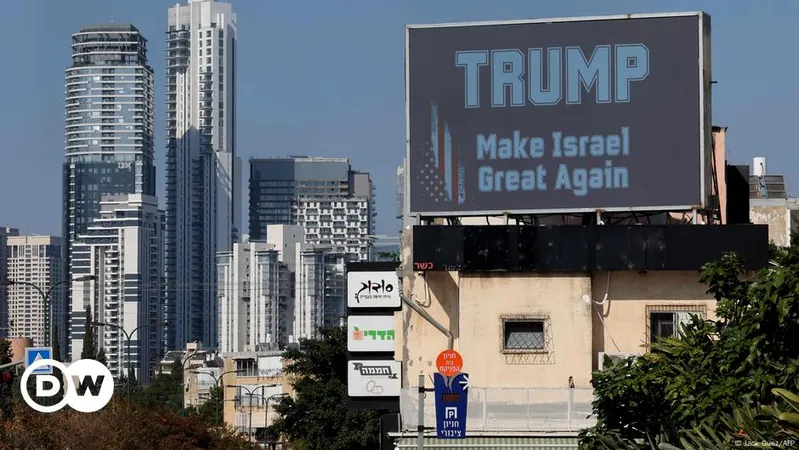
Trump's Victory: A Game Changer for Israel?
2024-11-09
Author: Ting
Trump's Victory: A Game Changer for Israel?
Donald Trump's recent reelection has sparked a wave of excitement in Israel. Prime Minister Benjamin Netanyahu hailed it as “the greatest comeback in history,” expressing his eagerness to collaborate with the president on matters of security. Even before the election was officially called, far-right coalition ministers Bezalel Smotrich and Itamar Ben-Gvir took to Twitter to share their exuberance, highlighting the strong ties that have formed between Trump's administration and Israel's current leadership.
In a statement released by Netanyahu's office, it was reported that the two leaders engaged in a warm and cordial conversation where they agreed to address pressing security issues, particularly the looming Iranian threat. This strategic alliance comes on the heels of Netanyahu’s dismissal of his defense minister, Yoav Gallant, seen as a key figure in maintaining relations with the Biden administration—an apparent signal of Netanyahu's pivot towards aligning with Trump.
A postelection poll revealed that a staggering 67% of Israelis are pleased with Trump's return, a sentiment that was echoed by Jerusalem residents expressing hopes that Trump would fulfill his promises for the region. "If he can keep even half of those promises, there just will be no words," lamented one young passerby, reflecting the anticipatory optimism that pervades the streets of Israel.
Trump's Controversial First Term Policies
During his first term, Trump took landmark actions that were controversial yet popular among pro-Israel factions. Notably, he recognized Jerusalem as Israel's capital and shifted the US embassy from Tel Aviv, a move that reversed decades of diplomatic policy and created a seismic shift in international relations. Additionally, Trump proclaimed Israel's sovereignty over the Golan Heights, a disputed territory that has been occupied since the 1967 war.
Moreover, Trump was the architect of the Abraham Accords, which normalized relations between Israel and several Arab nations but notably sidelined the Palestinian issue. Observers speculate he may now push for an even closer relationship between Israel and Saudi Arabia in his second term, possibly reviving plans for a controversial “Deal of the Century” that could further entrench Israeli settlements in the West Bank while offering limited autonomy to Palestinians.
However, the Trump-Netanyahu relationship has experienced fluctuations. After the catastrophic Hamas attacks in October 2023, Trump criticized Netanyahu for his administration's failure to adequately prepare for such an escalation. Analysts describe their relationship as intricate, with Netanyahu exhibiting a mixture of admiration and fear towards the often unpredictable former president.
Future Implications on the Middle East
As tensions continue to simmer in the Middle East, the incoming administration will undeniably need to navigate a complex landscape. While Trump has not articulated a concrete strategy for the region, he has voiced intentions to resolve ongoing conflicts swiftly. Political pundits suggest this reluctance to fully engage with the Palestinian issue could grant Netanyahu a broader license to execute his plans without restraint.
This is especially concerning given the historical context of Israeli settlements in the West Bank. While the Biden administration reversed many Trump-era policies, skepticism remains regarding their support for Palestinian rights amidst escalating settlement expansion, which could further complicate peace efforts.
Reports from Israeli sources indicate an "euphoric mood" among the settler community, closely aligning with Trump’s reelection. Plans to apply Israeli sovereignty to contested areas are already in motion, raising alarms about the future viability of the two-state solution. As Israeli leaders strategize further expansion, many fear that the prospect of a sovereign Palestinian state is becoming increasingly bleak.
On the Palestinian side, the humanitarian crisis deepens, particularly in Gaza, where over 90% of the population has been displaced amid ongoing hostilities. Voices from within Gaza, such as that of 22-year-old Shadi Asaad, highlight the despair felt amid the conflict. “We just want the war to stop, with or without a deal, with or without Trump,” he stated, encapsulating the hopelessness and urgency of the situation as the region braces for potential changes in US policy.
As Trump's presidency resumes, the eyes of both Israelis and Palestinians remain fixed on the implications of his administration's decisions, with hopes, fears, and political maneuvering intermingling in an ever-complex narrative.

 Brasil (PT)
Brasil (PT)
 Canada (EN)
Canada (EN)
 Chile (ES)
Chile (ES)
 España (ES)
España (ES)
 France (FR)
France (FR)
 Hong Kong (EN)
Hong Kong (EN)
 Italia (IT)
Italia (IT)
 日本 (JA)
日本 (JA)
 Magyarország (HU)
Magyarország (HU)
 Norge (NO)
Norge (NO)
 Polska (PL)
Polska (PL)
 Schweiz (DE)
Schweiz (DE)
 Singapore (EN)
Singapore (EN)
 Sverige (SV)
Sverige (SV)
 Suomi (FI)
Suomi (FI)
 Türkiye (TR)
Türkiye (TR)